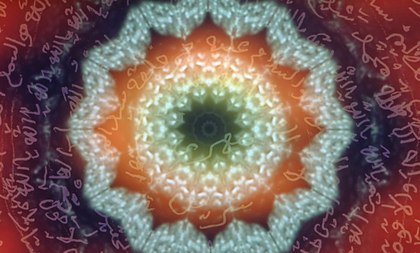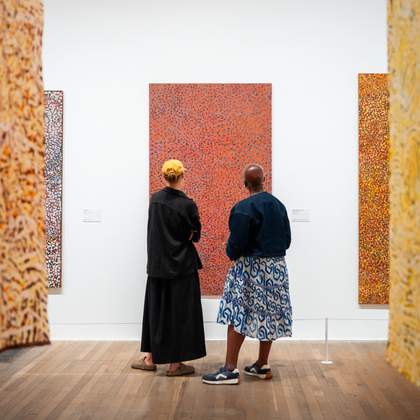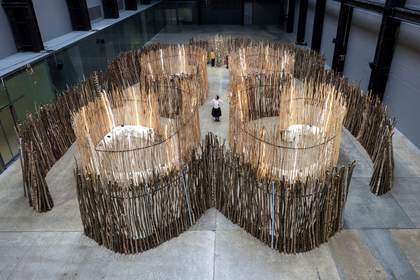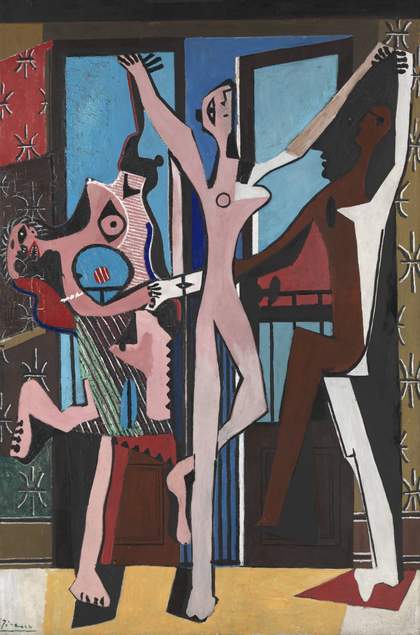Ancestral Knowledges: My Grandmother is my school focuses on Ancestral relations and forms of knowledge that have been transmitted across generations, despite attempts to discredit or devastate them. Over three days of talks, performances, screening, workshops and shared meals, we reflect on situated experiences across communities, land and histories. Rooted in exchange, the programme offers space to imagine collectively how we might challenge cultural, spiritual and ecological erasure.
In the short film below, three artists featured in the programme invite us into their homes, studios and kitchens, and offer their personal reflections on how ancestral knowledge influences their own art-making practices.
This event is organised by Hyundai Tate Research Centre: Transnational. Australian and New Zealand artist travel and administration is supported by the Australian Government through the International Cultural Diplomacy Arts Fund and the Australian Government Department of Infrastructure, Transport, Regional Development, Communications, Sport and the Arts.
Friday 14 November 12.00–20.30
Blavatnik Building Level 5 and Starr Cinema
Join a series of workshops and talks for Day One of the symposium. Find out more and book free tickets below.
12.00–13.30 | Workshop: Mataaho Collective
Blavatnik Building, Level 5
Join Mataaho Collective (Terri Te Tau, Bridget Reweti, Sarah Hudson, and Erena Arapere-Baker with guest emerging curator Java Bentley) in a collective weaving workshop. The session will embody the teaching and learning environment of Te Whare Pora from Aotearoa (New Zealand). Through collective acts of making, moving and weaving, the session will offer an insight into how scale, labour and intergenerational knowledge shape Mataaho Collective’s practice.
*This workshop is fully booked
14.00–14.10 | Introduction
An introduction to the first day of the symposium, by Tate curators.
14.10–15.10 | Performance: Tanya Lukin Linklater – A vessel is an atmosphere distilled, 2025
Blavatnik Building, Level 5
Tanya Lukin Linkater shares her new work, A vessel is an atmosphere distilled, performed with Talia Dixon and Sassa Linklater. The piece considers the tensions of history experienced by Indigenous people, when Ancestral belongings are held in institutions away from community care and access. The work references specific, now-inaccessible Sugpiaq weavings at the Kunstkamera, St. Petersburg, which were taken during colonial regimes in 19th century. This performance is a work-in-process showing of a commission for Fisher Centre at Bard College, New York, premiering in 2026.
15.30–16.15 | Keynote: Dr Robin R. R. Gray
Blavatnik Building, Level 5
Over the last decade, the term rematriation has become popularised in Indigenous discourse and through Indigenous activism. In this talk, Dr Robin R. R. Gray (remote) focusses on the active qualities of rematriation – what it is, what it wants, what it takes, and what it does – highlighting the necessity of rematriation for realising the future of Indigenous nationhood, and decolonisation.
Followed by a conversation between Dr Robin R. R. Gray and Kimberley Moulton, Adjunct Curator, First Nations and Indigenous Art, and an audience Q&A.
16.20–16.45 | Performance: Amrita Hepi – RINSE (Reprise Excerpt), 2020
Blavatnik Building, Level 5
Bundjalung and Ngapuhi woman Amrita Hepi presents excerpts from her solo performance work RINSE, premiered in 2022 with theatre-maker Mish Grigor. Based on an improvisational score, Rinse asks whether the future threat of societal extinction has led to a greater romanticisation of the past. The excerpt builds upon Hepi’s investigations into the hybridity under colonialism, in contrast to the centrality of the ‘neutral’ body within contemporary performance, exploring what is left when the thrill of a new beginning wears off.
17.00–17.45 | Panel Talk: Tanya Lukin Linklater and Amrita Hepi
Blavatnik Building, Level 5
This panel explores how movement can be used to communicate and centre Ancestral kinship and collaboration. Through choreography, Tanya Lukin Linklater and Amrita Hepi use the body as a tool for understanding oneself, others, colliding histories and liberated futures.
Followed by a conversation between the artists moderated by Kimberley Moulton, Adjunct Curator, First Nations and Indigenous Art, and an audience Q&A.
18.30–20.30 | Film Screening – Ancestral Futures
Starr Cinema, Natalie Bell Building, Level 1
Join us for a screening of artists’ film exploring memory, resistance and spirituality, followed by a conversation with the artists: Subash Thebe Limbu (remote), Saodat Ismailova (remote) and Ana Bravo-Pérez.
Subash Thebe Limbu’s Ladhamba Tayem; Future Continuous imagines a conversation between an 18th century Yakthung warrior fighting the colonial army and a time-traveller from the distant future, bringing the past and future of anticolonialism into convergence. Saodat Ismailova’s 18,000 Worlds functions as a ‘Video Talisman’ against the loss of forms of ancestral knowledge, highlighting a world losing touch with its Elders in the wake of Soviet imperialism. Ana Bravo-Pérez’s Mother Earth's Inner Organs follows the journey of coal from Amsterdam back to its origin in Wayuu territory in northern Colombia, centring Wayuu spiritual bond with Mma (Mother Earth) and the impact of extractivism on indigenous life, Earth and Earth beings.
The conversation between the filmmakers is moderated by Beatriz Garcia-Velasco, Assistant Curator, International Art, and is followed by an audience Q&A.
Saturday 15 November 10.30–19.30
Blavatnik Building Level 5
Discover Day Two's programme of workshops, talks and Q&As.
10.30–12.00 | Workshop: Corn and Clay – Reverence and Nourishment*
Lucia Pizzani leads a workshop uniting sound, video, clay, corn and other dry vegetation, to explore ideas of healing, nourishment and protection. Uplifting corn as a powerful cultural symbol, Pizzani will share stories and myths from her Venezuelan heritage and Mesoamerican cultures to generate discussion and thought around identity and migration. Participants will take part in a ‘Clay Drawing’ activity led by the artist, exploring a material rooted in ancient making processes.
12.30–12.35 | Introduction
An introduction to the second day of the symposium, by Tate curators.
12.35–13.35 | Keynote: Céline Semaan – A Woman is a School*
Join Céline Semaan as she discusses the themes of her book A Woman is a School (2024).
In A Woman is a School Semaan takes on the role of a hakawati: a storyteller of the Levant region of the Eastern Mediterranean, holding Indigenous knowledge and wisdom. Putting forward an expansive concept of the school in opposition to Western institutional education as an imperialist tool, Semaan pays ode to mothers, aunts, friends and the earth as teachers.
Followed by an audience Q&A, moderated by Nabila Abdel Nabi, Senior Curator, International Art (Hyundai Tate Research Centre: Transnational).
13.35–15.00 | Communal Meal*
Join us for connection and conversation around the themes of the symposium, over a (free) shared meal, for all symposium contributors as well as attendees.
This meal is supplied by The Syrian Sunflower. Founded by Syrian chef and human rights activist Majeda Khouri in 2019, through The Syrian Sunflower Majeda continues to share her heritage, advocate for human rights, and unite people through the universal language of food.
15.00–17.30 | Panel Talk: Narratives of the land – storytelling as community praxis*
Alia Swastika, M’Barek Bouhchichi (remote), Charmaine Watkiss and Rosalind Nashashibi explore the power and role of storytelling, to shape and produce critical thinking within the everyday. Looking to expanded forms of oral tradition to think through histories embedded in land – the stories passed down and across global geographies, just as seeds are dispersed upon the wind – this panel asks how narrative can foster identity and belonging, and transmit knowledge.
Followed by conversation between the artists moderated by Katrina Nzegwu, Assistant Curator, International Art, and an audience Q&A.
18.30–19.30 | Lecture-Performance: The empty seat at the table, reflections on the work of Palestine Hosting Society*
This (remote) lecture-performance weaves together storytelling, archival research, and acts of radical hospitality. Emerging from Mirna Bamieh’s long-term projects Palestine Hosting Society and Sour Things, it reflects on food as a site of disappearance and endurance. Bamieh invites audiences to consider how cooking, preserving and remembering can open a space for mourning, resilience and the imagination of a different future.
The performance includes a food offering, supplied by Bunhead Bakery. Bunhead Bakery is a Palestinian founded and female-led bakery in Herne Hill, South London, specialising in sourdough buns, with flavours rooted in Palestine.
Followed by a conversation with the artist moderated by Nabila Abdel Nabi, Senior Curator, International Art (Hyundai Tate Research Centre: Transnational), and an audience Q&A.
*All events on Saturday 15 November are fully booked
Sunday 16 November 10.30–16.30
Blavatnik Building Level 5 and offsite at Gasworks
Learn more about Day Three of the symposium and book your free tickets below.
10.30–12.30 | Workshop: A Ground to Walk On*
Artist Laura Burns invites participants to spend time creatively mapping their ancestral fields, with drawing and objects. Using simple movement exercises to tune into our bodies, this workshop makes space for the missing, forgotten, unknown, more-than-human, ancient ones and lands that impact our lineages. No factual or specific knowledge of your ancestors is necessary; the process is intuitive and felt.
13.00–14:30 | Performance: Dreaming Session – Embodied Knowledges, Somatic Practices*
Join us for sonic offerings and presentations from Phoebe Boswell, Tara Al Dughaither, Suzanne Kite (Oglála Lakȟóta) (remote) and Zayaan Khan (remote). In many cultures, dreaming connects people to their Ancestors; to greater understandings of interpreting the world, and one’s place within it. Exploring ‘dream-space’, this session will create space for reimagining the past, envisioning alternative ways of being in the present, and dreaming of new futures.
Followed by a conversation between the artists moderated by Marleen Boschen, Adjunct Curator, Art and Ecology, and an audience Q&A.
15.30–16.30 | Conversation: Grandma’s Stories – From Trinh T Minh-ha to all who may be known as ‘she who breaks open the spell’*
Xiaolu Guo and Sarah shin discuss Grandma’s Story, by postcolonial feminist theorist and filmmaker Trinh T. Minh-ha. Grandma's Story rethinks ideas about truth and fantasy to tell a different story about power, civilisation, history, medicine, and magic. This conversation explores how creative speech is connected to women’s powers of enchantment, drawing upon and speaking with storytellers including Theresa Hak Kyung Cha, Clarice Lispector, Maxine Hong Kingston, Leslie Marmon Silko and Zora Neale Hurston.
Grandma’s Story is published by, and this event is co-hosted with Spiral House, a new imprint of Silver Press.
17.00–18.00 | Performance: Marie-Claire Messouma Manlabien – Mémoires des corps*
The symposium concludes with a special offsite performance by artist Marie-Claire Messouma Manlabien. Mémoires des corps takes the form of a ritual that combines sound, words, textiles and various artefacts. Using stringed instruments, and crystal singing bowls tuned to resonate with the seven chakras of the body, the performance further develops Marie-Claire’s work around the bonds that humans form with their environment.
This performance is programmed in collaboration with Gasworks, on the occasion of Marie-Claire’s solo exhibition Mémoires des corps. Please note the performance takes place at Gasworks, 155 Vauxhall Street, London SE11 5RH and is booked through Eventbrite.
*All events on Sunday 16 November are fully booked. A waiting list is in place for the performance at Gasworks.
More information
Participants
Alia Swastika
Alia Swastika is a curator, researcher and writer whose practice explores issues and perspectives of decoloniality and feminism. Her different projects involve decentralising art, rewriting art history and encouraging local activism. She is the Director of the Biennale Jogja Foundation, Yogyakarta, and continues her research on Indonesian female artists during Indonesia’s New Order.
Amrita Hepi
Amrita Hepi is an Artist and Choreographer from the Bundjulung/Ngapuhi (AU/NZ) territories. Her work considers the body’s relationship to personal histories and archives, using performance and installation. Through-lines in her practice include the examination of historical fiction, the space where myth kisses history and the commodification of Indigenous culture as a global phenomenon.
Ana Bravo-Pérez
Ana Bravo-Pérez is an artist and filmmaker from Pasto, in the Andean-Amazonian region of Abya Yala. Her practice merges personal, decolonial and geopolitical questions, exploring migration, memory, suppressed narratives, and collective histories. She works with coal, cotton, gold, and plants such as coca and toquilla to reflect on colonial legacies and extraction.
Céline Semaan
Céline Semaan is a Lebanese-Canadian designer, writer, speaker and advocate. She is the founder of Slow Factory, an organization working at the intersection of environmental and social justice. Céline is on the Council of Progressive International, has been a Director’s Fellow of MIT Media Lab, and served on the Board of Directors of AIGA NY.
Charmaine Watkiss
Charmaine Watkiss is a British artist whose drawing practice investigates the botanical legacy of the Caribbean. She is particularly interested in herbal healing traditions handed down through the matrilineal line. She uses her own likeness as a way of constructing 'memory stories' which speak of a collective experience.
Laura Burns
Laura Burns is an artist and facilitator who blends ancestral practice with the four cardinal directions in an emergent pedagogy, centring a more-than-human field of witnessing. Drawing upon soul-work, spiritual ecology, practices of belonging, radical performance and decolonial land rights, their work asks how tending to body, land, ancestors and collective systems might lead to abolitionist futures.
Lucía Pizzani
Lucía Pizzani works across sculpture, photography, printmaking, drawing, and performance. Informed by her background in conservation biology and environmental activism, her practice explores the intertwined histories of the human and more-than-human. She is interested in transnational connections across regions including the origins and migrations of clay, which she has worked with for over fifteen years.
Marie-Claire Messouma Manlanbien
Marie-Claire Messouma Manlanbien was born in Paris in 1990, and grew up between France, Guadeloupe and Cote d’Ivoire. From a young age she was taught contemporary and traditional manual craft techniques by her mother and grandmother. Her work explores how ideas of femininity and the cosmos intersect across cultures, generations and materials.
Mataaho Collective
Mataaho Collective is a collaboration between four Māori artists (Terri Te Tau, Bridget Reweti, Sarah Hudson and Erena Arapere-Baker) who have worked together since 2012. Renowned for large-scale fibre-based installations, Mataaho develops work with a single authorship through a 'four-brain, eight-hand' approach, commenting on the complexity of Māori lives.
M’barek Bouhchichi
M’barek Bouhchichi explores the Black body’s representation in Moroccan society. His work engages with fragmentation, perception, and alterity through signs, imprints, and metaphors. Blending personal discourse with broader poetic and historical systems, his practice offers a reflective space where identity, difference, and corporeality are continuously reimagined.
Mirna Bamieh
Mirna Bamieh is a Palestinian artist exploring disappearance, memory and resilience through food. She founded the live art project Palestine Hosting Society in 2017, reviving vanishing Palestinian recipes as acts of resistance and remembrance. Her ongoing series Sour Things extends this inquiry, using fermentation as metaphor and method to reflect on grief, transformation and the slow politics of care.
Phoebe Boswell
Phoebe Boswell creates immersive installations which affect and are affected by the environments they occupy, investigating themes including protest, reclamation, grief, intimacy, migration, the body and its world-making. Her recent work considers the dichotomy of bodies of water as both repositories of painful historical experience and sites of renewal and hope.
Dr. Robin R. R. Gray
Dr. Robin R. R. Gray (Ts’msyen/Cree) is an Associate Professor of Sociology, Special Advisor on Rematriation, and Special Advisor on Indigenous Studies at the University of Toronto Mississauga. Her forthcoming book “The Rematriation Imperative: Paradigms for Indigenous Futurity” analyses the poetics and politics of return and the implications for Indigenous nationhood.
Rosalind Nashashibi
Rosalind Nashashibi is a Palestinian-English artist based in London. Nashashibi works mainly with 16 mm film but also makes paintings and prints. Her work often deals with everyday observations merged with mythological elements, considering the relationships and moments between community and extended family.
Saodat Ismailova
Saodat Ismailova is a filmmaker and artist from Uzbekistan. Her filmography addresses themes of national memory, women’s sovereignty, ritualism and mortality, and draws from ancestral knowledge, folklore, animism and traditional practices. In 2021 she founded the research collective Davra, devoted to studying, documenting and disseminating Central Asian culture.
Sarah Shin
Sarah Shin explores dreams, myth and transformation through writing, publishing and curation. She is a founder of Silver Press and Spiral House, a new imprint for art, poetry and ways of knowing. Her current collaborations include The Word for World: The Maps of Ursula K Le Guin exhibition and book.
Subash Thebe Limbu
Subash Thebe Limbu is a Yakthung (Limbu) artist from Yakthung Nation (Limbuwan), located in present-day eastern Nepal. Drawing from socio-political issues, resistance and science/speculative fiction, his work engages the notion of time, climate change and indigeneity through the critical lens of Adivasi Futurism, a framework he has been developing over several years.
Suzanne Kite
Suzanne Kite is an Oglála Lakȟóta artist, composer and academic working across sound, video, performances, instrument building, wearable artwork, poetry, books, interactive installations, and more. An enrolled member of the Oglala Sioux Tribe, Kite’s interdisciplinary practice explores Lakȟóta knowledge systems, embodied approaches to digital technologies and new ethical protocols of artificial intelligence.
Tara Aldughaither
Tara Aldughaither is a multidisciplinary artist, researcher, and curator exploring the often-erased narratives of women’s heritage in the Arabian Peninsula. In 2020, she founded Sawtasura, a platform dedicated to amplifying women’s sonic legacies across the Arab Gulf. Through her work, Tara reimagines collective memory and voice as living forms that bridge tradition and contemporary expression.
Tanya Lukin Linklater
Tanya Lukin Linklater thinks with weather, place and beingness in her practice. Her methods include embodiment, orality and poetics. Her recent exhibitions and performances have shown at Dia Chelsea, New York, Camden Art Centre, London, and Wexner Center for the Arts, Ohio. She is Sugpiaq from the Kodiak archipelago of Alaska.
Xiaolu Guo
Xiaolu Guo was born in China. Her recent memoir, Once Upon a Time in the East, won the National Book Critics Circle Award, was shortlisted for the Costa Biography Award and the Rathbones Folio Prize 2018. Her most recent novel Call Me Ishmaelle, reimagining Moby Dick, was published in 2025.
Zayaan Khan
Zayaan Khan is a transdisciplinary artist who explores relationships between land, food and seed through multiple lenses. She is a 2024 Prince Claus fellow and current mentor of the Cultural & Artistic Responses to the Environmental Crisis cohort. Zayaan is Head Librarian at the Seed Biblioteek in Cape Town, South Africa.
Convenors
Beatriz García-Velasco
Beatriz García-Velasco is Assistant Curator, International Art at Tate Modern. Alongside working on exhibitions, live performances, commissions and film programmes, she develops the Tate collection through the Latin American Acquisition Committee. She is editor and writer of publications including the Artist Series: Frida Kahlo, Capturing the Moment and the Disclaimer special issue Preemptive Listening.
Kimberley Moulton
Kimberley Moulton is a Yorta Yorta woman who lives and works on Wurundjeri/ Boonwurrung lands, Melbourne, and London, England. She is Adjunct Curator, First Nations and Indigenous Art at Tate Modern and Senior Curator at RISING, Melbourne. She is interested in anti-colonial curatorial methodology, and First Nations representation and access in museums and galleries.
Jarelle Francis
Jarelle Francis is a curator with an MA in Curating Contemporary Art from the Royal College of Art. He works as an Exhibitions Assistant and has previously held the same position at The Centre for British Photography. In 2023 he founded Meadow, a nomadic project space which works with emerging artists to produce new solo exhibitions.
Katrina Nzegwu
Katrina Nzegwu is Assistant Curator, International Art at Tate Modern. She has worked across exhibitions, site-specific sculptural commissions and live performance, with a focus on community-based praxis. She has written for platforms and places including Elephant, The London Magazine, Burlington Contemporary and emergent, and is part of the creative collective When They Meet.
Marleen Boschen
Marleen Boschen is a researcher, lecturer and curator working at the intersections of art and ecology. She is a post-doctoral fellow at Kew Gardens working on the project Future Ecologies of Art: Exploring Kew as a Site for Past, Present and Future Artistic Engagements. She is co-curator of Testing Grounds, the artistic programme of the garden of Villa Romana, Florence.
Nabila Abdel Nabi
Nabila Abdel Nabi is Senior Curator, International Art, Tate Modern and lead of the Hyundai Tate Research Centre: Transnational. She has worked on exhibitions including The Genesis Exhibition: Do Ho Suh: Walk the House, Hilma af Klint & Piet Mondrian: Forms of Life, The Making of Rodin, as well as major collection displays including The Shape of Words, Anna Boghiguian, Farah Al Qasimi, Huguette Caland, Akram Zaatari, Yto Barrada, Wael Shawky, and Infinite Geometry. She also leads the Middle East North Africa Acquisitions committee at Tate.
Each day, you will be able to access a livestream of the talks, workshops and performances by clicking the links below.
14 November, 13.00: watch livestream on YouTube
14 November, 18.30: watch livestream on YouTube
15 November, 12.30: watch livestream on YouTube
16 November, 13.00: watch livestream on YouTube
This event will be BSL interpreted, and live-streamed (see above).
All Tate Modern entrances are step-free. You can enter via the Turbine Hall and into the Natalie Bell Building on Holland Street, or into the Blavatnik Building on Sumner Street.
There are lifts to every floor of the Blavatnik and Natalie Bell buildings. Alternatively you can take the stairs.
- Fully accessible toilets are located on every floor on the concourses.
- A quiet room is available to use in the Natalie Bell Building on Level 4.
- Ear defenders can be borrowed from the Ticket desks.
To help plan your visit to Tate Modern, have a look at our visual story. It includes photographs and information about what you can expect from a visit to the gallery.
For more information before your visit:
- Email hello@tate.org.uk
- Call +44 (0)20 7887 8888 (daily 10.00–17.00)





